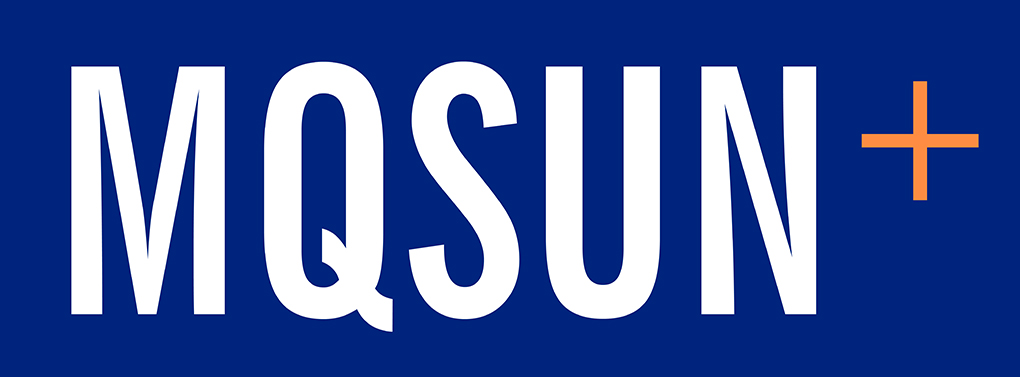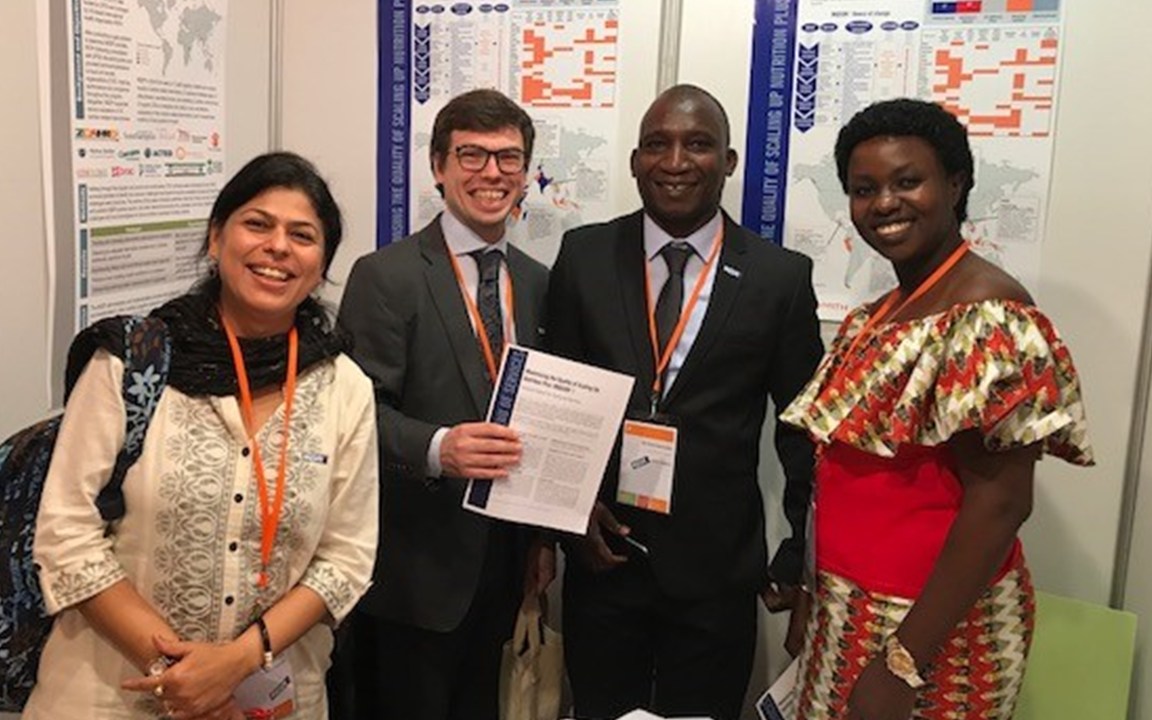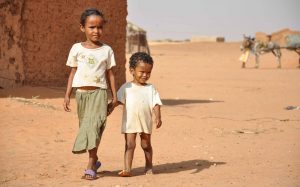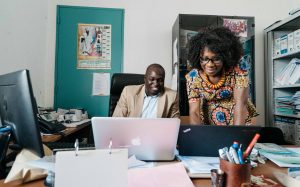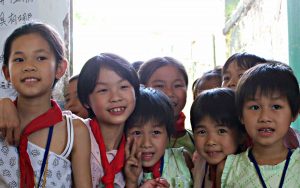Since 2012, Maximising the Quality of Scaling Up Nutrition (MQSUN) and now MQSUN+ has provided technical assistance (TA) to over a dozen Francophone Scaling up Nutrition (SUN) countries—focused primarily on supporting countries to conduct the SUN budget analysis exercise or to advance their multisectoral nutrition planning efforts. Under MQSUN+, the majority of technical assistance in Francophone countries related to nutrition financing has been carried out by consultant Mr Mamadou Kone. Mr Kone is a health economist with over 10 years of experience in financial and statistical analysis, costing and budget development, monitoring and evaluation and grant management.
Since 2017, Mr Kone has supported activities related to costing multisectoral national nutrition plans in Togo, Guinea and Burundi and will soon support Gabon with a similar exercise. This may include assessing a plan’s readiness to be costed, mapping and costing the scale up of high-impact nutrition interventions or developing a budget for the implementation of plan activities. As well, in 2018, Mr Kone provided guidance and support to multiple Francophone countries to carry out the SUN budget analysis, including in-country visits to Mali, Guinea and Gabon. This includes facilitating the collection and validation of relevant budget data—working intensively with government stakeholders and national consultants to strengthen their internal capacity to engage in future rounds of the exercise.
Recently, MQSUN+ sat down with Mr Kone to get his perspective on working with multiple Francophone countries in nutrition financing.i
What do you see as the most important part of your role as an MQSUN+ consultant and in supporting SUN countries? Do you see the role as being similar or different for each country you have supported?
Countries usually only know the goal they need to reach, but they do not have a good idea of the path they need to take to reach that goal. As an MQSUN+ consultant, I bring the methodology and tools needed to reach the country’s goal for either costing a national nutrition plan or doing the budget analysis exercise. As well, different countries may have different levels of understanding of the process; while in general, my role is similar for each country. In some cases, I may help a country realise what they are currently achieving–for example, helping them understand what nutrition-sensitive interventions they are currently funding in their countries.
How do you feel your capacity has been built/what skills have you learned since being involved in the SUN Movement and supporting SUN countries?
Prior to starting work with MQSUN, I had not been exposed to nutrition at all. Working with MQSUN and now MQSUN+ has allowed me to understand the importance of nutrition and some of the key basic concepts of nutrition, including the concept of nutrition-specific and nutrition-sensitive actions. The MQSUN/MQSUN+ work has also made me a better negotiator and conciliator. These skills are very important when working on costing a multisectoral plan for a country, as different stakeholders have different perspectives and these perspectives have to be reconciled together with my own thought process to produce a budget most, if not everyone, will be satisfied with. Finally, this work has allowed me to improve my capacity to develop new costing tools that are accepted by country stakeholders, as there is no standard tool for nutrition, especially in a multisectoral context.
How have you been able to adapt your support for multisectoral planning from one country to another—learning from past experience?
There is definitely a need to adapt from one country to another, as each country is a different context. What is important is that the more countries I have worked in, the more my approach to the work matures. For example, when I started costing nutrition plans, I would just work with the country to gather the needed data and enter that data into the costing tool that I had developed. However, later on, other countries were showing real interest in whether my methodology and tool were appropriate for the costing exercise. As a result, my first step for any nutrition costing work now is presenting and agreeing on the methodology and tool to be used before proceeding with the work. There is also the need to make sure countries understand that the costing of a plan should not start after the people who wrote the plan have completed their work. The plan might not be written in a costing-friendly manner or preliminary costing results could indicate the need to revise proposed activities if the budget looks to be unrealistic for the country. If the people who developed the plan are not available anymore when the costing is being conducted, it could be a challenge to make the needed adjustments.
What has been your experience working with national consultants, government representatives and other country stakeholders?
My experience has been very positive in general, as many times government officials have been directly involved to learn and understand the process. For the budget analysis exercise, for example, there have been a few cases where the national team has dedicated resources from their teams to shadow my work. In one case, the government actually asked me to provide guidance and quality assurance to two staff resources who were tasked to complete the analysis. I wish more countries could take this approach. Not all national teams can make themselves available though, so sometimes the country requests for me to work with a local consultant instead that can be called upon later as needed. In my experience, people like to try out or learn new tools, so it is not a surprise that countries are interested in being involved in the work since they usually do not have experience with tools needed to cost a multisectoral nutrition plan.
Do you see any synergies between the TA you have provided for multisectoral planning compared to TA provided supporting the SUN budget analysis?
The two activities complement each other. The budget analysis exercise can help the country have an idea of the internal resources they have available and help calibrate the plan’s costing exercise. For example, reviewing the budget analysis exercise of previous years prior to costing a plan will give an idea of realistic commitments from the government during the costing exercise. The multisectoral planning can also give an idea of which sectors/ministries are involved to make sure that the budget analysis exercise is as complete as possible.
In the short-term, what have you seen as the impact of MQSUN+’s support? How has the TA helped move the country forward in advancing nutrition?
It is difficult to see impact, as nutrition moves slowly, but in some cases, I have been able to see the attitude of a country in regards to nutrition move forward. For example, one country I have been supporting, in the beginning, just considered nutrition as a subset of food security within agriculture. Now, they understand that nutrition is bigger than that, and it is sometimes food security or agriculture that is feeding into nutrition. As well, in terms of costing, I feel that doing the funding gap analysis of costed plans has given national teams strong tools to advocate for better funding for nutrition in the country.
What do you see as the next steps in each country’s efforts to scale up nutrition?
I think the next steps for the countries are to encourage better coordination of available nutrition funding within countries using the funding gap analysis of the costed plans as well as to build and strengthen the nutrition capacity in-country, as there are currently not enough nutritionists to provide technical guidance. As well, it may be useful to look into making the process for accessing technical assistance more simple and transparent for government officials. From my experience, countries can get discouraged at the current process for requesting assistance and give up. If they truly need that assistance and cannot access it from in-country partners, then it is important for the external assistance mechanism to be simple and efficient to help the countries advance their nutrition agenda without too much delay.
We want to thank Mr Kone for taking the time to talk with MQSUN+ about his experience providing technical assistance as well as Ms Sandrine Fimbi for conducting the interview and translating his responses.
i Mr Kone’s responses have been translated and abbreviated from the original interview for the purposes of this blog.
